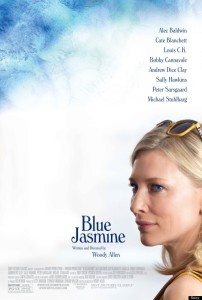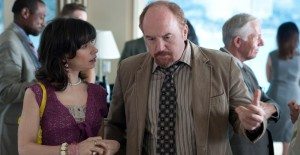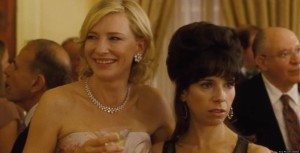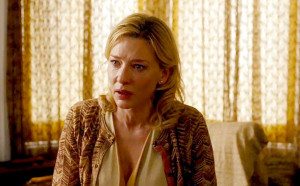Blue Jasmine is not an enjoyable movie. It’s about a mentally disturbed, irritating, irrational, miserable woman who, over the course of the movie, changes not at all. She’s exactly as awful at the start as at the end, which isn’t necessarily a bad thing in a movie character, if, for example, the movie has something to say about the unchanging nature of the character’s awfulness, but Blue Jasmine doesn’t, nor does it have anything to say about anything else. It’s a dull exercise in by-the-numbers movie-making Allen has become all too efficient at executing, one per year, ad nauseum.
I wrote a list of Woody Allen’s ten best movies some months ago in which I pondered whether the then-shooting Blue Jasmine would or would not completely suck. The answer? It doesn’t completely suck! Hooray! What’s good about it? As is often the case in Allen’s movies, the performances. Cate Blanchett literally eats the scenery in her protrayal of the nutso Jasmine, creating a three-dimensional portrait of a deranged women cracking up. The portrait doesn’t actually resemble anyone in the real world, but for an imaginary “crazy neurotic rich lady only found in the movies,” she nails it.
The set-up is that Jasmine’s rich husband is arrested for lying and cheating etc., goes to jail and hangs himself. Poor Jasmine flees NYC to San Francisco to stay with her working-class sister, Ginger (Sally Hawkins), who lives in an awesome SF apartment that to Jasmine looks like a dump. Well, it is on South Van Ness, for god’s sake, so there’s that for verisimilitude.
Ginger is dating Chili (Bobby Cannavale), a street-smart working stiff disparaged endlessly by Jasmine. Because he’s poor, you see. As you might imagine, it turns out that Ginger and Chili, living their modest yet honest lives, are in the end shown to be happier than once-rich Jasmine. Who could have seen that coming?
Everyone. This movie is so thinly scripted you can see right through it. The scenes are all brief sketches of exposition, as bad as any Hollywood spectacular, but with that certain Woody Allen witiness. Is it funny? I chuckled twice. Mostly I cringed and wished everyone would quit yelling their bad expositional dialogue.
Jasmine’s adventures in SF are intercut with scenes from her prior rich life in NYC, presented as a bizarre and unrealistic cliché of horrible rich people being horrible and rich. Alec Baldwin plays Jasmine’s husband. He has nothing to do but squint and act mean. Aside from Jasmine, who is at least uniquely awful, all of the characters are one-note cliches, including Ginger’s ex-husband Augie, played by one-time comedian Andrew Dice Clay. He’s getting rave reviews for, I guess, not being as awful as you’d expect? Or something? Anyway, he’s fine in his three scenes and ten minutes of screen time.
Louis C.K., on screen for maybe five minutes, feels like the only actual human being in the movie. Everyone else is a Woody Allen caricature.
In SF, Jasmine takes classes to learn how to use a computer. So she’s, what, 40-something? And never in her life used a computer? Got it. She wants to meet men, so a random woman in her class invites her to a party. Wouldn’t it have been wonderful if Jasmine was taken to a typical SF party? Some kind of wild, Burning Man related freak-show? What a fascinating clash of cultures that would have been.
But no. She’s taken to a magical rich person party. Where she meets a guy (Peter Sarsgaard) who falls instantly in love with her, and he’s rich, and he has a new house that needs decorating, and Jasmine claims to be an interior decorator, and days later he asks her to marry him, but when they go to buy a ring, who should appear out of nowhere for no reason at all save plot-advancement but Augie? Who yells at Jasmine, thus revealing all of her lies to the new guy, who literally dumps her out of his car on the side of the road.
I’m sorry, have I given too much away? Believe me, five minutes into this thing and you’ll see everything coming. There’s not a single surprise in here, save one: how Jasmine’s husband came to be busted, a big reveal at the end. It seems to shed all kinds of new light on Jasmine, and yet…you think about it and…well…no, actually, it doesn’t shed any light on anything.
The world the movie takes place in is as imaginary as its main character. Remember the movie-within-a-movie in The Purple Rose of Cairo? The story of an Egyptologist whisked away to New York by wealthy elites who drink martinis at impossibly fancy clubs, it parodies the kinds of movies Hollywood made in the ‘30s, all brimming with rich socialites reveling in their expensive furs at black-tie parties in lavish apartments. Woody Allen has finally become his own parody. His characters could exist nowhere but in the movies. His idea of San Francisco is laughable. We give him a pass when his movies are set in New York—hey, at least he lives there, and he is a rich movie star, maybe this world is all he knows—but transplant that world to another, very different city, and it couldn’t be any more tone-deaf. The movie has nothing whatsoever to do with San Francisco. Without changing a single line of dialogue if could have taken place in any city in the world, and been exactly as unbelievable.
If you were kind, you could call this movie a “character study.” Many famous directors, mostly European, have made many such movies, movies in which plot or even story takes a backseat to the central character, where the point is to inhabit one person’s life, to get so deeply inside of them that greater human truths are revealed.
Blue Jasmine isn’t a character study. It’s carefully plotted. Simplistically, carefully plotted, using simplistic, one-dimensional characters. What, exactly, is it?
Easy. It’s a Woody Allen movie. Or, more exactly, a thin imitation of a Woody Allen movie. Do yourself a favor and skip Blue Jasmine. Rent Manhattan or Stardust Memories or Crimes And Misdemeanors instead.








oof. and it looked so promising from the shorts.
But…but… Mick LaSalle LOVED it!!
Mick Lasalle is the ideal movie reviewer. Inevitably, every movie he loves is terrible, and every movie he hates is grand. He’s a perfect barometer.
2 things >
1. you should do a list of great Character Study films.
off the top of my head.
In Bruges
Citizen Kane
Taxi Driver
Raging Bull
Ghost Dog
Dead Man
Chopper
Lots of Coen Bros films
1-b The Informant! is a good example of a character study where the character learns nothing. Maybe Young Adult too.
2. The whole thing with cities. I loved Fast & Furious 5 but number 6 I just couldn’t get my head around it because it’s set in London and they were racing through central London and there was no traffic. I just couldn’t take it seriously nor suspend my disbelief. I’ve been meaning to write a blog about it.
This year alone I’ve watched some great films that I guess could be classified as Character Studies:
The Conversation
The Verdict
Super
Being There
The Twilight Samurai
The last film I watched was The Wolverine. I know I shouldn’t watch these films anymore but reading comics as kid means I keep watching them no matter how bad they are. Technically that’s a character study too but not a very good one.
I suppose many movies are to one degree or another ‘character studies.’ Some definitely have more plot to carry them along. The Conversation, for example, has a mystery at its core. It’s just that by the end you realize the mystery itself wasn’t the point.
I wanted to hear more from the black worker in the dentist office who waved goodbye to Jasmine as she left work. I just knew she would have livened up the movie.
You are soooo right!!
Spot on review, SB. I checked out for awhile, because I couldn’t keep up with the existential dissertations (in blog form) about the art of film, and I always end up getting sucked into your site for too long.
I have not seen many films in the past few months, but I had the misfortune of going to this one, expecting Woody Allen, comedy, and a plot involving a rich New Yorker sister on the mend going to live with her poor sister in SF. I should have read your write up first. This is one of the darkest movies I have ever seen, and I have not seen such callous, self absorbed characters perhaps since the debut of Happiness. The movie is physically nauseating, and I was particularly disturbed by the audience’s amusement at Blanchett’s character being sexually assaulted by her married boss. This is black comedy without hyperbole; I have no idea what inspired Allen to write this dark film, except perhaps to invite the audience to metaphorically throw rotten tomatoes at rich sociopaths who prey upon the lower classes. There are literally no redeemable characters in this movie, and few of them garner any sympathy while most of the gags derive from their misfortune.
Though the movie is well-made and Blanchett’s performance is stellar, I have no idea why the majority of critic and audience reviews are so enthusiastic for such a dismal, cynical commentary on human nature.
No one is able to resist the pull of Mind Control for long…
My only answer to why critics and audiences like this movie is that it’s a Woody Allen movie. Which is all it takes, I think. He does make a kind of movie that basically no one else makes anymore. It’s about adults, it’s made for adults, it deals with relationships, etc. and so forth. When I saw it, I don’t think a single person in the audience was younger than 40. Allen has his demographic all to himself. The people seeing his movies aren’t also spending their summers seeing Iron Man and Star Trek. They see movies infrequently, and when they do, it’s going to be something like Blue Jasmine.
Because Allen is the old master at these movies, he is somehow given a pass. Just that it’s one of his movies is enough. Which actually, this happens to artists in all fields, once they’ve been around long enough. They reach an age where nothing they do is really criticized. They become beloved, no matter what. Allen went through a number of periods where his movies weren’t universally liked, but now he’s having what critics like to call ‘a late career resurgence,’ but which is really just the result of Allen still being here and still making movies.
Definitely would explain it. Probably about time for the industry to give him (another?) lifetime achievement award. I certainly won’t complain about the quality of the movie; it’s just sooo bleak. The horror, the horror.
Thank you. I felt the same way, and then I read all of these great reviews.
I don’t think you can accuse audiences and critics and going nuts just because it’s a Woody Allen film. Nobody’s had much trouble panning a good number of his disasters of the years. Blue Jasmine is way above par (looking at his later period, of course; I agree it’s not as good as some of his classics). It’s ambitious (as an updated version of Streetcar), topical, challenging, disturbing and brilliantly acted (both female leads deserve props, though Blanchett obviously steals the show). I agree that the plot and dialogue are often transparent, and some of the characterizations are too trite and easy. It certainly lacks subtlety, but it has depth and complexity. And generally, I admire movies that make me feel for and try to understand characters that are despicable. It also works as a classical tragedy: a woman falls because of her inability to accept reality. You say she doesn’t change at all, but that’s not entirely true, as you even acknowledge: she cracks up. She desperately tries to stop her fall by pretending to be something she is not, but her inability to accept who she is finally destroys her. It’s a flawed movie, but in some respects brilliant.
I got half way through the show had enough of over acting terrible direction. There is no way I would spend my money to watch such a B rated film. Call it another Woddy Blunder.
Just watched this last night on a streaming channel, desperate for–well, something. Drawn by Cate Blanchett, but suspicious of premise from capsule description. Forgot the title was Woody Allen, but had my suspicion from the opening titles–they were in the usual Allen font type and text-on-black-screen presentation. Then talented actors began speaking in Allen-only stilted dialog and it was a cinch. Stuck with it, waiting for the Stella-Stanley scene that seemed as obvious as everything else in the movie. Instead we get Stanley crying in the produce section, no Blanche-Stanley blowup, and jump to one more hollow babbling Blanche bit as a finale.
Your review stands out: clear-eyed and not having it. Thank you for it. (I was once converted to Allen-ism by Love and Death, but haven’t been able to stand him or his movies for decades.)
My favorite moment of crazy lowness in this movie? Going out on to Peter Sarsgaard’s new deck and finding myself on the deck of the former Trident restaurant in Sausalito. (I’m nearly certain, and recall that Annie Hall was also filmed here.) No wonder he could “entertain 200-300 people out here!”